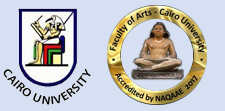عنوان المقال عربي
الاستفهام المجازي في مسرحية إليكترا للشاعر سوفوكليس: دراسة تطبيقية في ضوء نظرية سياق المقام.
Document Type
Original Study
Keywords English
Sophocles, Electra, unreal interrogation, Semantics
كلمات مفتاحية عربي
سوفوكليس, اليكترا, الاستفهام المجازي, الدلالة
Abstract English
This paper aims to extract the unreal interrogation in "Electra" Sophocles according to situational context theory, which affirms that the lexical meaning is not everything in understanding the meaning of speech, as there are non-linguistic elements that interfere in defining Meaning. The interrogation is classified into two types: 1- a real interrogation by which the questioner seeks to know what he is ignorant of, 2- unreal interrogation, which is what modern linguists call the indicative interrogation, formulated in an interrogative style, in which the questioner is aware of what he is asking about. And has a meaning from the metaphorical meanings that the recipient understands from the linguistic context, and these metaphorical meanings are rich and varied that accommodate various forms of thought, so the interrogative form can to be inquisitive in a particular context, and to be informative in another context. When examining the linguistic structures in which the unreal interrogation mentioned in "Electra" Sophocles, and analyzing its deep structure, I found a variety of linguistic indications that the unreal interrogation benefited from, I relied in this paper on the theory of the context through the semantic approach based on description, analysis and application.The source study of "Electra" Sophocles extracted (113) witnesses for unreal interrogation. I have classified those into (19) chapters, and each of these chapters represents a certain type of the main semantic statements, which in turn include sub-semantic statements according to the context in which the unreal interrogative form is mentioned.
الملخص العربي
تهدف هذه الورقة البحثية إلى استكشاف الاستفهام المجازي في مسرحية "إليكترا" للشاعر سوفوكليس في ضوء نظرية سياق المقام، وهي النظرية التي تؤكد أن المعنى المعجمي ليس كل شيء في إدراك معنى الكلام، فثمة عناصر غير لغوية تتدخل في تحديد المعنى. ويصنف الاستفهام في نوعين: أ-استفهام حقيقي يتوخى به صاحبه معرفة ما يجهله، ب-استفهام مجازي وهو ما يطلق عليه علماء اللغة المحدثين مصطلح الاستفهام الإخباري، مصوغ في قالب أسلوب استفهام، وفيه يكون السائل عالمًا بما يسأل عنه، لكنه يقصد فيه معنى من المعاني المجازية التي يفهمها المتلقي من السياق اللغوي عند تأمل النص، وهذه المعاني المجازية ثرية ومتنوعة تتسع لشتى ضروب الفكر، ويعتمد في ذلك على تحليل سياق المقام، فالصيغة الاستفهامية يمكن أن تكون استفسارية في سياق مقامي معين، وتكون هي نفسها إخبارية في سياق مقامي آخر. وعند حصر شواهد التراكيب اللغوية التي ورد فيها الاستفهام المجازي في مسرحية "إليكترا" سوفوكليس، وتحليل بنيتها العميقة، وجدت مجموعة متنوعة من الدلالات اللغوية التي يفيدها الاستفهام المجازي، التي خرجت به إلى أفاق علم الدلالة الرحب، واعتمدت في التنظير لهذا النوع من الاستفهام على نظرية سياق المقام من خلال المنهج الدلالي القائم على الوصف والتحليل والتطبيق.وتوصلت الدراسة المصدرية لمسرحية "إليكترا" سوفوكليس إلى استخراج (113) شاهداً للاستفهام المجازي. وقمت بتصنيفها في(19) مبحثاً، بحيث يمثل كل مبحث من هذه المباحث نوعًا معينًا من أنواع الإفادات الدلالية الرئيسة، والتي تشمل بدورها إفادات دلالية فرعية وفق سياق المقام الذي ترد فيه صيغة الاستفهام المجازي
Recommended Citation
(2023)
"The unreal Interrogation in "Electra" Sophocles according to Situational Context Theory.,"
Journal of the Faculty of Arts (JFA): Vol. 83:
Iss.
4, Article 29.
DOI: https://doi.org/10.21608/jarts.2023.212310.1361
Digital Object Identifier (DOI)
10.21608/jarts.2023.212310.1361
Accept Date
2023-11-20
Publication Date
10-1-2023

